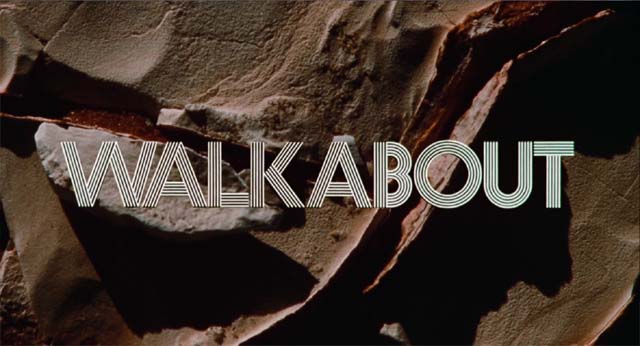
Rent Walkabout on Amazon Video (paid link) // Buy the novel (paid link)
Written by: Edward Bond (screenplay by), James Vance Marshall (from the novel by), Nicolas Roeg (story, uncredited)
Directed by: Nicolas Roeg
Starring: Jenny Agutter, David Gulpilil, Luc Roeg
Rated: GP [PG-13]
Watch the trailer
Plot
Two city-bred siblings are stranded in the Australian Outback, where they learn to survive with the aid of an Aboriginal boy on his "walkabout", a ritual separation from his tribe.
Verdict
While simplistic this does a lot. It examines the clash between the city and the wilderness; advanced isn't always better as two children discover that their education hasn't prepared them for survival. At times this almost feels like a documentary as they venture through the Outback. This draws several contrasts between the Outback and the city which provides a lot of depth. It's a harsh place, unwelcome to outsiders that often only want to exploit it.
Watch it.
Review
This opens with images of a city including students, people, families, streets, and cars. Then there's a quick image of the Outback that seems like it might be a contrast.
 |
| Jenny Agutter, Luc Roeg play Girl, Boy |
A family drives into the Outback for a picnic. What happens next, I didn't see coming. I wondered if this was implying that modern society drives people mad. This starts an unnamed girl (Jenny Agutter) and her brother's (Luc Roeg) journey in the Outback as a cutaway shows ants eating their picnic food. There are frequent cutaways to animals and landscapes. It's foreshadowing that the wilderness will consume them. While the city and inhabitants build and push nature back, nature has a way of reclaiming.
 |
| David Gulpilil, Luc Roeg, Jenny Agutter play Aboriginal, Boy, Girl |
The girl is saddled with the responsibility of keeping her young brother safe, but she's ill-equipped to survive. The Outback is never depicted as inviting. Any animals they encounter hiss or worse. The girl realizes their predicament, but the boy is young enough that he thinks it's all a game or some kind of adventure. Ignorance is bliss. More advanced doesn't mean better, and the frequent cutaways show the harshness of nature. It also underscores that these kids don't belong. This movie is wilderness versus the city. As advanced as society is, they can't survive in the wild when pushed out of the city. Advancements don't mean much when they're far away.
They're saved by an Aboriginal boy (David Gulpilil) on his walkabout. He can easily survive with just a spear. He knows how to find food and water. While there's a language divide, they manage to communicate through hand signals. The boy hunts and feeds them, ensuring the city kids will survive. I though the hunting scenes looked quite real, and it turns out they are real.
This is almost like a nature documentary, showing us the wilderness and how unforgiving it can be. There's a simplicity to this movie that mirrors the simplicity of the Outback. That stands in stark contrast with how busy the city is. It took several opening images to relay the scope of the city, but just one to show us the Outback.
The brother and sister end up in an abandoned mining town. That has to be intentional. Cities come in take resources and space, then vacate and leave their trash behind. It's like the hunters we saw that shot more buffalo than needed. The Aboriginal boy would never kill more than what's necessary. It would cause the herd to die out and shortages in the future. City people don't look to the future, selfishly wanting it all now. They take from the land, ignoring any consequences.
This ends with the girl grown up, living in the city, but we see that she longs for the wilderness and her time in the Outback. While it was inhospitable, she was happy. The business of the city, the amenities don't make her content. That's a powerful message, as it's unlikely anyone is watching this out in the wild.

No comments :
Post a Comment